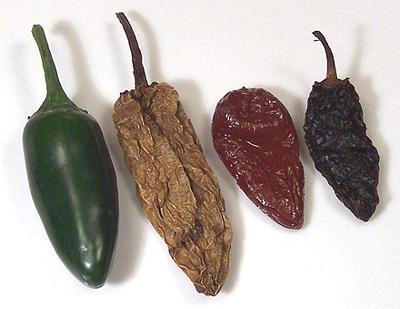
[C. annuum var. glabriusculum]
Jalapeño type chilis, fresh green, red, pickled, and smoked, are very important to all the cuisines of Mexico, as well as TexMex cuisine north of the border. and have started invading other cuisines. The Jalapeño is the state chili of Texas.
Because of their unique flavor and thick flesh, Jalapeños are not "plug compatible" with other green chilis in recipes. Genetic analysis shows Jalapeños to be a distinct clade within Capsicum annum, with no close relatives outside the clade. There are many cultivars of Jalapeños, differing in size, hotness, and ideal growing conditions.
More on Chilis.
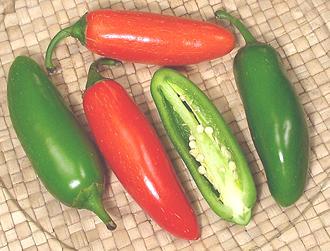 [Cuaresmeños, Chile Gordo (green, Mexico); Huachinango (red,
Mexico)]
[Cuaresmeños, Chile Gordo (green, Mexico); Huachinango (red,
Mexico)]
These are usually sold in the fresh green state. Their flesh is quite thick, so they don't dry well at all. They are usually 2 to 3 inches by 1 inch diameter, with blunt tip, hottness H5-H6. The skin is dark green (or red), smooth and shiny but often has faint stretch marks (corking). Due to growing conditions, specimens with corking tend to be considerably hotter than those without. With its thick flesh and distinctive flavor, the Jalapeño is the preferred chili for many Mexican salsas and for hot pickled peppers.
Red ripe Jalapeños are very rare, even in Southern California, probably because Huy Fong Foods of Irwindale, CA buys pretty much the entire supply to make their famous Sriracha, Chili Garlic, and Sambal Olec Hot Sauces. They don't actually use Jalapeños in Vietnam (yet) but the owner of Huy Fong loves them.
Plant breeders have recently developed special "low heat" and "no
heat" varieties of Jalapeno so "Mexican" restaurants in New York can
advertise "real Jalapeno peppers" without devastating the population.
Fortunately, if we grow any of those here, we export them all.
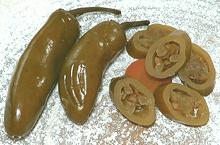
[Jalapeños en Escabeche]
These are a very popular condiment and/or snack in Mexico. They are often
pickled with slices of Carrot included. Ing: Jalapeño peppers,
Water, Vinegar, Carrots, Onions, Salt, Sugar, Vegetable oil, Calcium
chloride, Spices.
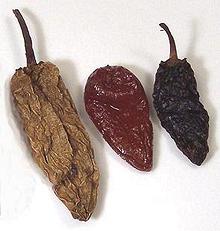
These are Jalapeño Chilis that have been smoked. Because their thick walls make them unsuitable for sun drying, this method of preserving them was developed thousands of years ago. Chipotles will generally be somewhat less hot than the Jalapeños, so figure around H4-H5.
The common versions are:
¤ Brown Chipotle: [Chipotle Meco,
Tipico] The most common kind in Mexico, but not so common north
of the border. It is a ripe jalapeno, dried and intensively smoked,
properly over a smoldering pile of jalapeno foliage.
¤ Chili Morita: (right in photo) A
red ripe jalapeño of a small variety, smoked less intensively than
Chipotle Meco, and dried. Since they are much smaller, they are often
mistakenly called "smoked serrano", but Serranos would be much hotter.
¤ Chipotle in Adobo Sauce: this is the
form of smoked Morita chilis most common in the U.S. - see below. The
sauce has been wiped from the center photo specimen.
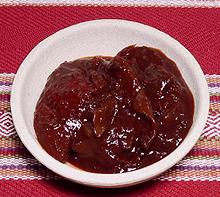 C. annuum var. glabriusculum]
C. annuum var. glabriusculum]
Lightly smoked ripe Morita chilis are put up in a red Mexican Adobo Sauce,
commonly made of onions or garlic, vinegar, tomato paste, sugar, chili powder,
and spices. These chilis and their sauce are absolutely essential for some
Mexican and Tex Mex recipes. The have a particular affinity for scrambled
eggs. The chilis and sauce are quite moderate in heat, and there is no
substitute for their unique flavor. It is available in 7 ounce and 12 ounce
cans. Check the ingredients - those made with high fructose corn syrup may
be inferior.